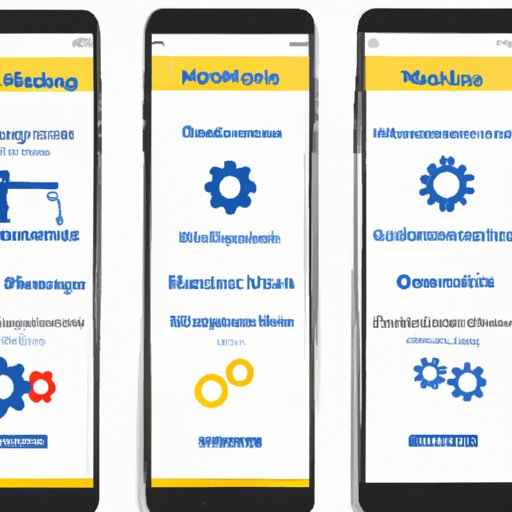Introduction
Mobile automation is the use of software and technology to automate processes within mobile applications. It allows for efficient and cost-effective development and testing of mobile applications, as well as the integration of other systems into the mobile app environment. This article will provide a comprehensive guide to mobile automation, exploring its benefits, different types of tools available, best practices for implementation, and how it is transforming the workplace.

A Comprehensive Guide to Mobile Automation
Mobile automation is a relatively new concept, but one that is quickly gaining traction in the world of software development and testing. Here is a comprehensive guide to help you understand mobile automation and how it can benefit your business.
Overview of Mobile Automation
Mobile automation is the use of software and technology to automate tasks within a mobile application. This includes tasks such as user interface (UI) testing, performance testing, functional testing, and integration testing. It also includes the integration of other systems into the mobile app environment, such as back-end databases and APIs. In short, mobile automation helps developers and testers to quickly and efficiently develop, test, and deploy mobile applications.
Benefits of Mobile Automation
The primary benefit of mobile automation is improved efficiency. By automating tedious and time-consuming tasks, developers and testers can save time and resources, allowing them to focus on more important tasks. Additionally, mobile automation can increase productivity by reducing the number of errors and bugs in an application. Finally, mobile automation can reduce costs associated with development and testing, as manual processes tend to be more expensive than automated ones.
Mobile Automation Testing
Mobile automation testing is the process of using automated tools to test a mobile application. This includes UI testing, which involves testing the appearance and usability of the application; performance testing, which tests the speed and responsiveness of the application; and functional testing, which tests the functionality of the application. Automated testing can help identify any issues or bugs in the application before it is released, ensuring that it is of the highest quality.
How Mobile Automation Can Improve Your Business
Mobile automation can provide numerous benefits to businesses, from improved efficiency and increased productivity to reduced costs. Here are some of the ways in which mobile automation can improve your business.
Improved Efficiency
Mobile automation can help streamline processes, making them more efficient. This means that tasks that would normally take hours or days can be completed in minutes or even seconds. By automating mundane tasks, businesses can save time and resources, allowing them to focus on more important tasks.
Increased Productivity
Automation can also help reduce the number of errors and bugs in an application, resulting in increased productivity. Automation can also help ensure that applications are released quicker, allowing businesses to get their products to market faster.
Reduced Costs
Finally, mobile automation can help reduce costs associated with development and testing. Manual processes tend to be more expensive than automated ones, so businesses can save money by utilizing mobile automation.

The Different Types of Mobile Automation Tools Available
There are a variety of mobile automation tools available, both open source and commercial. Here is an overview of the different types of tools available.
Open Source Automation Tools
Open source automation tools are freely available and can be used to automate tasks within a mobile application. Popular open source automation tools include Appium, Selenium, and Robotium. These tools are typically used for UI testing and functional testing.
Commercial Automation Tools
Commercial automation tools are paid tools that offer more features and support than open source tools. Popular commercial automation tools include TestComplete, Ranorex, and Experitest. These tools are typically used for performance testing, functional testing, and integration testing.

Best Practices for Implementing Mobile Automation
Implementing mobile automation can be a daunting task, but there are some best practices that can help make the process easier. Here are some tips for successfully implementing mobile automation in your business.
Develop a Clear Strategy
Before implementing mobile automation, it is important to develop a clear strategy that outlines the goals, objectives, and timeline for the project. This will help ensure that everyone involved is on the same page and that the project runs smoothly.
Choose the Right Tool
Choosing the right tool is essential for successful mobile automation. Consider the features and capabilities of each tool and select the one that best meets your needs. If necessary, consult with experts to help you choose the right tool for your project.
Utilize Automation Reports
Automation reports can provide valuable insights into the performance of your mobile application. These reports can help identify any issues or bugs in the application, allowing you to quickly address them before they become a problem.
How Mobile Automation is Transforming the Workplace
Mobile automation is transforming the way we work, from facilitating remote working to increasing collaboration and enhancing security. Here are some of the ways in which mobile automation is transforming the workplace.
Facilitating Remote Working
Mobile automation is making it easier than ever for employees to work remotely. Automation tools allow employees to access data and applications from anywhere, allowing them to be productive regardless of their location.
Increasing Collaboration
Mobile automation is also making it easier for teams to collaborate. Automation tools allow team members to share information, documents, and files quickly and securely, eliminating the need for lengthy email threads or physical meetings.
Enhancing Security
Finally, mobile automation can help enhance security. Automation tools can help protect sensitive data by encrypting it and limiting access to authorized personnel. This can help prevent malicious actors from accessing confidential information.
Conclusion
In conclusion, mobile automation is an invaluable tool for businesses looking to improve efficiency, increase productivity, and reduce costs. There are a variety of mobile automation tools available, both open source and commercial. When implementing mobile automation, it is important to develop a clear strategy, choose the right tool, and utilize automation reports. Finally, mobile automation is transforming the workplace, facilitating remote working, increasing collaboration, and enhancing security.
Summary of Key Points
• Mobile automation is the use of software and technology to automate processes within mobile applications.
• Mobile automation can improve efficiency, increase productivity, and reduce costs.
• There are a variety of mobile automation tools available, both open source and commercial.
• When implementing mobile automation, it is important to develop a clear strategy, choose the right tool, and utilize automation reports.
• Mobile automation is transforming the workplace, facilitating remote working, increasing collaboration, and enhancing security.
Final Thoughts
Mobile automation is revolutionizing the way businesses operate, from improving efficiency and increasing productivity to facilitating remote working and enhancing security. By leveraging mobile automation, businesses can save time, resources, and money, allowing them to stay ahead of the competition.
(Note: Is this article not meeting your expectations? Do you have knowledge or insights to share? Unlock new opportunities and expand your reach by joining our authors team. Click Registration to join us and share your expertise with our readers.)
